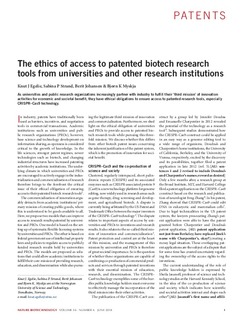| dc.contributor.author | Egelie, Knut Jørgen | |
| dc.contributor.author | Johansen, Berit | |
| dc.contributor.author | Strand, Sabina P. | |
| dc.contributor.author | Myskja, Bjørn Kåre | |
| dc.date.accessioned | 2019-03-20T09:28:53Z | |
| dc.date.available | 2019-03-20T09:28:53Z | |
| dc.date.created | 2018-06-07T09:35:48Z | |
| dc.date.issued | 2018 | |
| dc.identifier.citation | Nature Biotechnology. 2018, 36 (6), 495-499. | nb_NO |
| dc.identifier.issn | 1087-0156 | |
| dc.identifier.uri | http://hdl.handle.net/11250/2590769 | |
| dc.description.abstract | As universities and public research organizations increasingly partner with industry to fulfill their 'third mission' of innovation activities for economic and societal benefit, they have ethical obligations to ensure access to patented research tools, especially CRISPR–Cas9 technology. | nb_NO |
| dc.language.iso | eng | nb_NO |
| dc.publisher | Nature Research (part of Springer Nature) | nb_NO |
| dc.title | The ethics of access to patented biotech research tools from universities and other research institutions | nb_NO |
| dc.type | Journal article | nb_NO |
| dc.type | Peer reviewed | nb_NO |
| dc.description.version | acceptedVersion | nb_NO |
| dc.source.pagenumber | 495-499 | nb_NO |
| dc.source.volume | 36 | nb_NO |
| dc.source.journal | Nature Biotechnology | nb_NO |
| dc.source.issue | 6 | nb_NO |
| dc.identifier.doi | 10.1038/nbt.4165 | |
| dc.identifier.cristin | 1589589 | |
| dc.description.localcode | © 2018. This is the authors' accepted and refereed manuscript to the article. The final authenticated version is available online at: https://doi.org/10.1038/nbt.4165 | nb_NO |
| cristin.unitcode | 194,66,10,0 | |
| cristin.unitcode | 194,62,70,0 | |
| cristin.unitname | Institutt for biologi | |
| cristin.unitname | Institutt for filosofi og religionsvitenskap | |
| cristin.ispublished | true | |
| cristin.fulltext | postprint | |
| cristin.qualitycode | 2 | |
